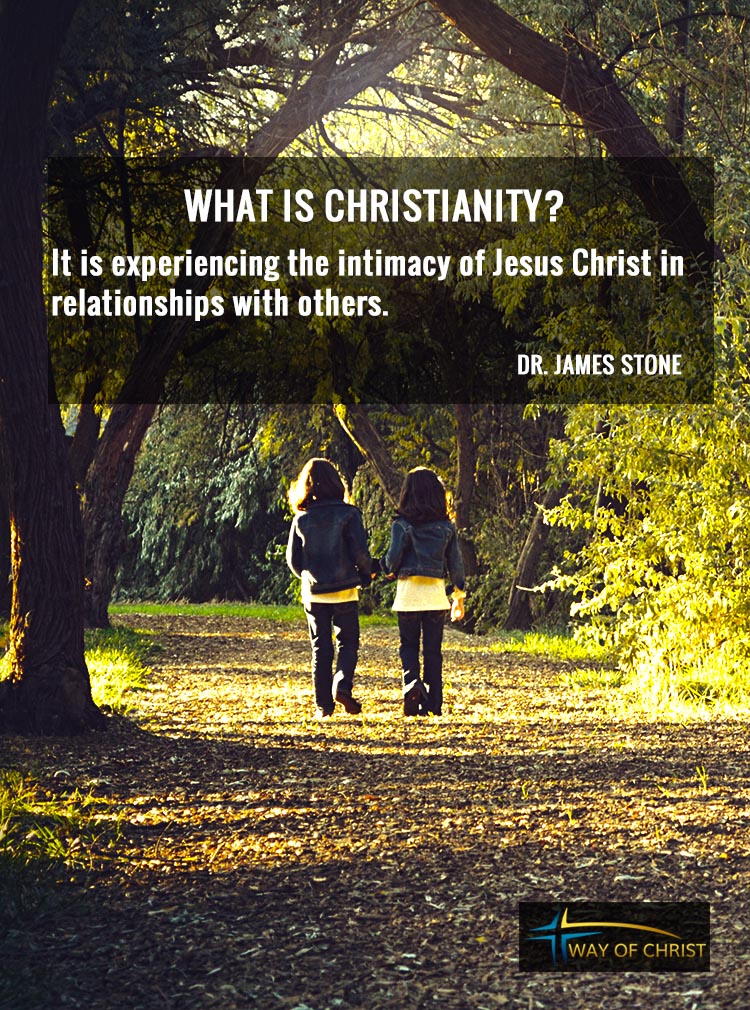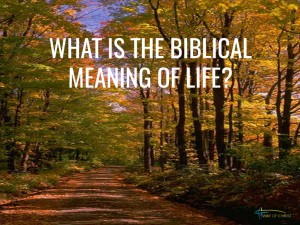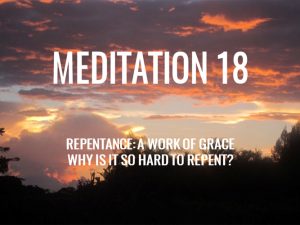
What is Christianity can be explained as experiencing the life of Jesus Christ.
What is Christianity is the question, but perhaps the real question should be, “What is life?” For Jesus Christ, the founder of Christianity, said, “. . . I am come that [you] might have life, and that [you] might have it more abundantly” (John 10:10). The what in “What is Christianity” is simply life, the experiencing of Jesus Christ.
“What is Christianity” also raises the question of where exactly is this life experienced. What is the realm of real living? Jesus said:
As the Father hath loved me, so have I loved you: continue ye in my love . . . These things have I spoken unto you, that my joy might remain in you, and that your joy might be full . . . love one another, as I have loved you (John 15:8-12).
What is Christianity? Experiencing the Love of Christ in Relationships
What is Christianity? Ultimately, it is to love and to be loved. It is experiencing the intimacy of Jesus Christ in relationships with others.
In the most precise statement ever written of what is Christianity, Jesus said,
“Ye have not chosen me, but I have chosen you, and ordained you, that ye should go and bring forth fruit, and that your fruit should remain: that whatsoever ye shall ask of the Father in my name, he may get it you” (John 15:16).
First, notice the sequential order of the statement. The way the word “that” is used gives the statement a sequence of how God works in our lives. Something occurs in order for something else to occur.
The choosing and ordaining produces something: “that ye should go and bring forth fruit and that (italicized in the KJV, meaning it is not in the original manuscript) your fruit should remain.” The going, the bringing forth fruit, and the fruit remaining are products of being chosen and ordained.
They do not produce themselves. We are chosen and ordained that something might be produced in us.
In turn, the going, the bringing fruit, and the fruit remaining also produce something: “that whatsoever ye shall ask of the Father in my name, he may give it you.” Again, “whatsoever ye shall ask . . . may give it you” occurs out of the going, the bringing fruit, and the fruit remaining. One is the product of the other.
Although it is not understood yet, everything that occurs in your life hangs upon Jesus choosing and ordaining you. Previously, Jesus had said,
I am the vine, and my Father is the husbandman. Every branch in me that beareth not fruit he taketh away: and every branch that beareth fruit, he purgeth it, that it may bring forth more fruit. Now ye are clean through the word which I have spoken unto you. Abide in me, and I in you. As the branch cannot bear fruit of itself, except it abide in the vine; no more can ye, except ye abide in me. I am the vine, ye are the branches: He that abideth in me, and I in him, the same bringeth forth much fruit: for without me ye can do nothing. (John 15:1-5)
Fruit only comes when we are abiding in Jesus and Jesus in us. This simple truth is the essence of all that is Christianity.
What is Christianity? It is What God Does for Us
All the days of our life is the story of what God does for us. Although many perceive that the fruit of which Jesus is referring is what man does for God: the number of people won to the Lord, the good deeds accomplished, or any product produced by the believer. Fortunately, the gospel of Jesus Christ tells a different story. It proclaims what God has done for us.
Even though most struggle to perceive it, Jesus came into the world for only one reason. He said, “. . . I am come that they might have life, and that they might have it more abundantly” (John 10:10). Amazingly, man was created just to have life in Jesus.
For example, the fruit of an apple tree is an apple. It is not apple pie, or even another apple tree. Although the meat of an apple is the main ingredient of an apple pie and the seed of the apple is the essence of another apple tree, the apple does not have the capability to produce an apple pie or to produce another apple tree.
The apple does not help the baker make the apple pie, other than be used by the baker. The seed of the apple even has to die before another apple tree can come forth. The apple is to be just the apple.
Although the visible church keeps trying to get “apples” to make apple pies and apple trees, the good news of the gospel of Jesus Christ is that man was created to be just the “apple.” The secret of experiencing life is in just being the fruit of what Jesus produces.
When man was created, he became a living soul (Gen. 2:7). Jesus came to bring man back to “life, and that [man] might have life more abundantly.” Originally created to live and regenerated “that [he] might have life,” man is to experience the bringing forth of fruit and that fruit should remain (not die).
Religion adamantly protests the truth that God did not create man to serve him, to worship him, or to live for him. The religious cannot perceive that God created man out of his own good pleasure–simply because he wanted man to experience his love (John 3:16), to experience his life.
Working so hard to produce apple pies and new apple trees, we often become weary and frustrated when we see the “worm” eventually destroy our efforts. Life, the essence of Christianity, is not in what man does for God. It is in what God does for man.
This is not to say there will never be any apples pies or new apple trees. What it does mean, however, is that the apple pies and the apple trees are the product of something far greater that the apple. The meat of the apple may be the ingredient of the apple pie and the seed of the apple the essence of another apple tree, but the apple can never produce an apple pie or an apple tree.
What is Christianity? We are Created to Live an Abundant Life in Jesus
If we were created just to live in him and to keep on living, how is it then that so many of us never experience that abundant life?
The answer lies hidden in the meaning of
Ye have not chosen me, but I have chosen you, and ordained you, that ye should go . . . (John 15:16) .
It is unfortunate that too many of us regard ordained as being “invested with the office of a minister, a priest, or rabbi.” The original word that is translated ordained means “to place (in a passive, horizontal position as opposed to a vertical active posture.” Jesus said to his disciples that they had been chosen to be placed in a horizontally and passive posture.
Then, Jesus said that the reason why his disciples were placed in this horizontally and passive position was that they would go. The original word translated go in his statement is not the usual word for go with its common meaning “to traverse.” This word means “to lead under, i.e. withdraw or retire (as if sinking out of sight).”
The mystery of life is hidden in this statement of Jesus. You and I, all men, were chosen by Jesus to be placed in a horizontally and passive posture until we sink out of sight. The fruit of the abundant life, which is the manifestation of Jesus in our lives, will only come when this has occurred. Jesus takes us down that he might come forth. He is life!
What is Christianity? It is experiencing the manifestation of Jesus Christ in and through our lives.
Where does this life occur? What is the realm of real living?
Jesus, again, tells us the answer. He said,
As the Father hath loved me, so have I loved you: continue ye in my love. If ye keep my commandments, ye shall abide in my love; even as I have kept my Father’s commandments, and abide in his love. These things have I spoken unto you, that my joy might remain in you, and that your joy might be full. This is my commandment, That ye love one another, as I have loved you. (John 15:8-12)
When Jesus stated that “As the Father hath loved me, so have I loved you . . . [and] that ye love one another, as I have loved you,” he is not giving a comparison of how love ought to be. He is not trying to emphasize that he loved us to the same degree as the Father loved him.
Neither is he trying to emphasize that we should love one another to the same degree that he loved us. Thank God, for we do not have the capability to love as Jesus loved. He is simply revealing the power source of all love.
Jesus loved man through the love he experienced in the Father. We can love one another because we have experienced the love of Jesus toward us. His love, “as I have loved you,” enables us to love each other.
In reality, it is the actually the love of Jesus flowing through us to the one we love. The experiencing of the love of Jesus in relationships with one another is the fruit that God desires to produce in our lives. When all is said and done, the joy of living comes down to being loved and loving.
To be loved and to love is the reason you were chosen, ordained, and taken out of sight. God takes you down in order that Jesus, who is love, may be raised. In Jesus, we live.
What is Christianity?
It is experiencing the intimacy of Jesus Christ in relationships with others.






